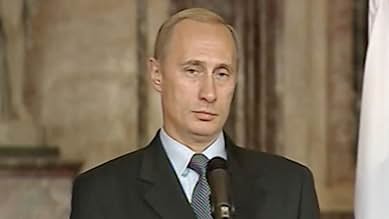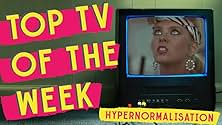HyperNormalisation
- 2016
- 2 Std. 46 Min.
Adam Curtis erklärt, wie sich Politiker und die Menschen, die sie vertreten, in einer Zeit verwirrender und unerklärlicher Weltereignisse in eine schädliche, übermäßig vereinfachte Version d... Alles lesenAdam Curtis erklärt, wie sich Politiker und die Menschen, die sie vertreten, in einer Zeit verwirrender und unerklärlicher Weltereignisse in eine schädliche, übermäßig vereinfachte Version der Geschehnisse zurückgezogen haben.Adam Curtis erklärt, wie sich Politiker und die Menschen, die sie vertreten, in einer Zeit verwirrender und unerklärlicher Weltereignisse in eine schädliche, übermäßig vereinfachte Version der Geschehnisse zurückgezogen haben.
- Nominiert für 1 BAFTA Award
- 2 Nominierungen insgesamt
- Narrator
- (Synchronisation)
- Self - Businessman
- (Archivfilmmaterial)
- Self - Russia Leader
- (Archivfilmmaterial)
- Self - NYC Workers League
- (Archivfilmmaterial)
- Self - Singer
- (Archivfilmmaterial)
- Self - US Secretary of State
- (Archivfilmmaterial)
- Self - President of Syria
- (Archivfilmmaterial)
- Self - Economist
- (Archivfilmmaterial)
- Self - Syria Social Affairs Minister
- (Archivfilmmaterial)
- Self - US Department of Defense
- (Archivfilmmaterial)
- Self - President of the United States
- (Archivfilmmaterial)
- Self - Ronald Reagan's Wife
- (Archivfilmmaterial)
- Self - Ayatollah of Iran
- (Archivfilmmaterial)
- (as Ruhollah Khomeyni)
- Self - US Navy Commander, Chaplain
- (Archivfilmmaterial)
- Self - Psychologist
- (Archivfilmmaterial)
- Self - Electronic Frontier Foundation
- (Archivfilmmaterial)
- Self - Computer Hacker
- (Archivfilmmaterial)
- Self - Ruler of Lybia
- (Archivfilmmaterial)
- (as Muammar Gadaffi)
Empfohlene Bewertungen
My Curtis is probably the most accurate - devastating documentarist I've ever seen.
I think Mr Curtis' ouvre is a visual record on part with the witness of Malcolm Gladwell, and though they're interests differ,, these 2 are supporters of the tent poles which hold us up - personally and as a race.
Watching, I find it difficult to not watch, but, for every brake in his narrative, I'm almost fearful to continue watching.
I've always said there's nothing more chilling than realty.
If you're sometime who wants to begin to understand, 'wtf is going on with this works and how had it happened?' here it is.
I don't want to say to much, aside from this is truly the real 'Shock of the New (to borrow, from my favourite art historian essayist, and general bad boy, Robert Hughes).
The way he does it here is as compelling and confusing and frustrating and flawed as one would imagine; it really succeeds in making some of his other work look like the tightest factual presentation ever. In almost three hours we explore the story by touching on Gaddafi, Ayatollah Khomeini, the internet, politics, Donald Trump, 1970's Russian sci-fi; the Arab spring; perception management, drugs, Brexit, UFO conspiracies, Twitter, and so on. Often the links are tenuous, but Curtis structures it really cleverly – we are given chunks of facts in a presentation that makes sense, and as a result we accept the links even as they jump countries and decades.
The downside is that many will be turned off because this is polemic incorrectly presented as a documentary. It is not the latter but as the former it works very well. Although it runs to almost 3 hours, I did not find it boring, but rather found it quite compelling in its message and the manner in which it is presented. The strength of the film to me was not that it convinces in every word, or that I agreed with it wholly but rather that it gave me plenty to think about. It helps that I am old enough to remember many of these events – to have seen the shifting political allegiances, to experience the moments, and to feel like they were not organic in all cases.
HyperNormalization is a niche film – it did not even make it not a BBC channel but rather was put on the streaming service directly. It is not as smart as it wants to, but it is engaging and interesting whether you agree with all of its assertions or not.
Whether or not we as an audience agree with individual pieces and arguments within this film, it's impossible to ignore that Curtis is using the tools, tone, and legitimization (thank you BBC) of the "brainwasher" to brainwash audiences against brainwashing, and to stimulate critical thought. These clever tricks makes this one of the best documentaries ever made, as it continually challenges the viewer's intelligence and perception of the world. There are many documentaries that make more factual, easy-to-prove arguments -- but this film does not intend to do that. Instead, HyperNormalisation challenges the audience with a 3 hour barrage of questions, often stated in the form of answers. How Curtis arrives at these answers creates one of the most thought-provoking films of the 21st century. The point is to not accept Curtis's sometimes shaky (perhaps only in the interest of keeping the runtime down, perhaps not) arguments as facts, but rather to consider them. If you are looking for a simple documentary that is easily proven factually true, this is not it. In fact, HyperNormalisation seems to suggest that form of documentary may not exist.
This film is not an answer, but a question. If you disagree with Curtis, read some books and articles and prove him wrong on your own, if you can. Either way you'll be a better and more educated person for watching this film. HyperNormalisation takes more than it's already 2 and half hour runtime to watch. I paused, researched, and questioned the entire time. HyperNormalisation requires fact checking and educating oneself on aspects of world politics restricted from mainstream thought, and asking questions about the "answers" he provides. Whether a deranged conspiracy theorist or one of the greater minds of the 21st century is up to the viewer, but either way Adam Curtis successfully challenges his audience with this film. Though I don't fully agree with everything put forth in this film, I have to admit that more and more about HyperNormalisation rings true to me in the present day than when it was created. Thank you Curtis for making me think about the world in this way.
Oh, and the soundtrack is incredible. : - )
This is great viewing and really gets you to think hard about the issues that matter: nothing can truly be explained by a 140-character tweet and that's exactly the problem: the world is too interlinked and complex to be understood via superficial analysis nor poetic slogans.
We need to collectively understand the deeper issues at hand, and find the solution that deals at source - building walls, imperial slogans, bigotry and racist knee-jerk responses are not the way
Peace
WUSSTEST DU SCHON:
- WissenswertesThe term "hypernormalisation" is taken from Alexei Yurchak's 2006 book Everything was Forever, Until it was No More: The Last Soviet Generation, about the paradoxes of life in the Soviet Union during the 20 years before it collapsed.
- Zitate
Narrator: This was a new world that the old systems of power found it very difficult to deal with. In the wake of the 9/11 attacks, the security agencies secretly collected data from millions of people online. One program was called optic nerve. It took stills from the webcam conversations of millions of people across the world, trying to spot terrorist planning another attack. The program did not discover a single terrorist, but it did discover something else.
- SoundtracksThe Vanishing American family
Written by Scuba Z
Interpreted by Scuba Z
Top-Auswahl
- How long is HyperNormalisation?Powered by Alexa
Details
- Erscheinungsdatum
- Herkunftsland
- Offizielle Standorte
- Sprachen
- Auch bekannt als
- Гипернормализация
- Drehorte
- New York City, New York, USA(Establishing shots, aerial views, Underground scenes, Citicorp headquarters building and inside offices, WTC North and South Towers in night aerial view, Trans World Bank headquarters building in day aerial view, Manhattan and the Statue of Liberty in aerial view.)
- Produktionsfirma
- Weitere beteiligte Unternehmen bei IMDbPro anzeigen
- Laufzeit2 Stunden 46 Minuten
- Farbe
Zu dieser Seite beitragen
































